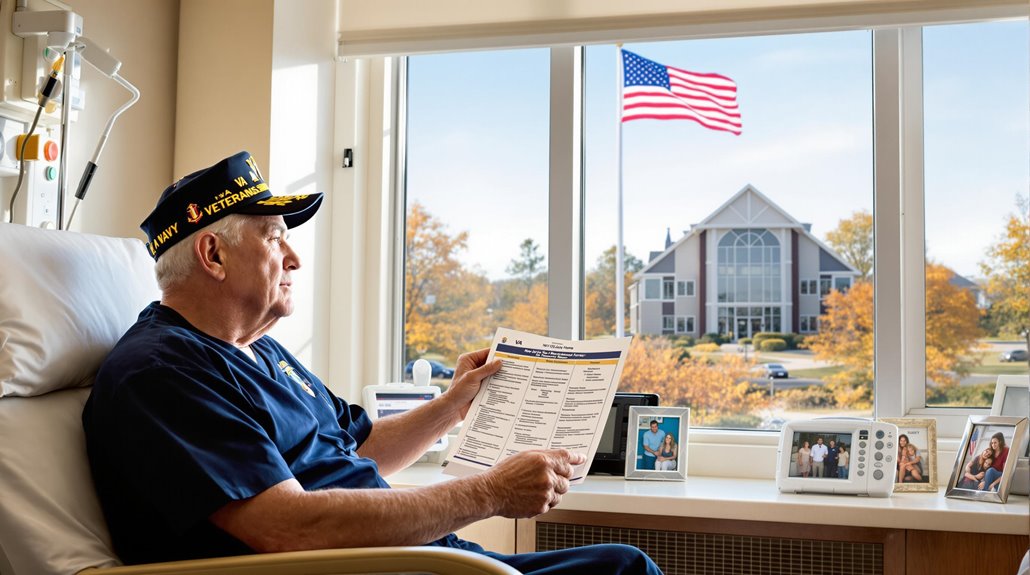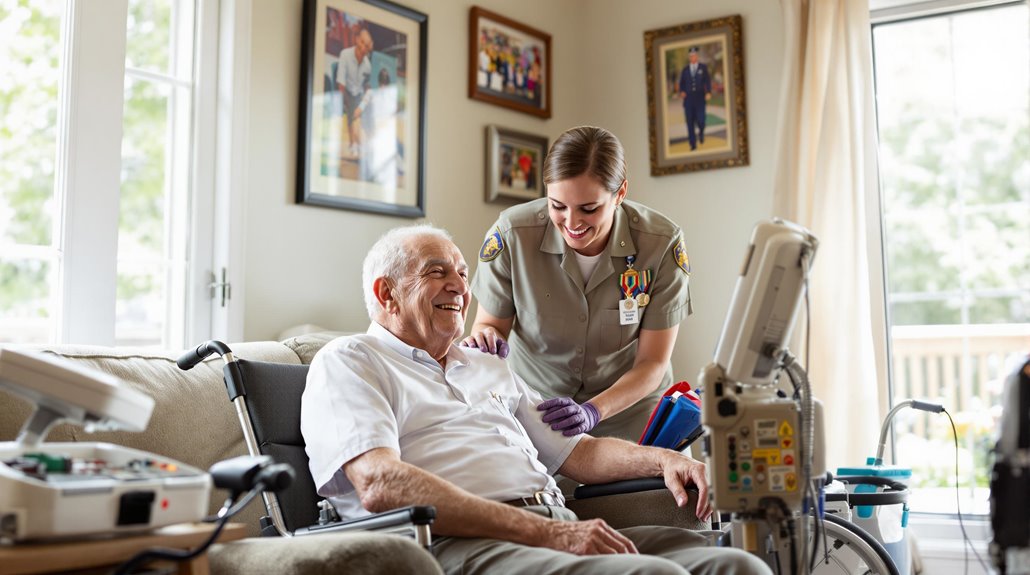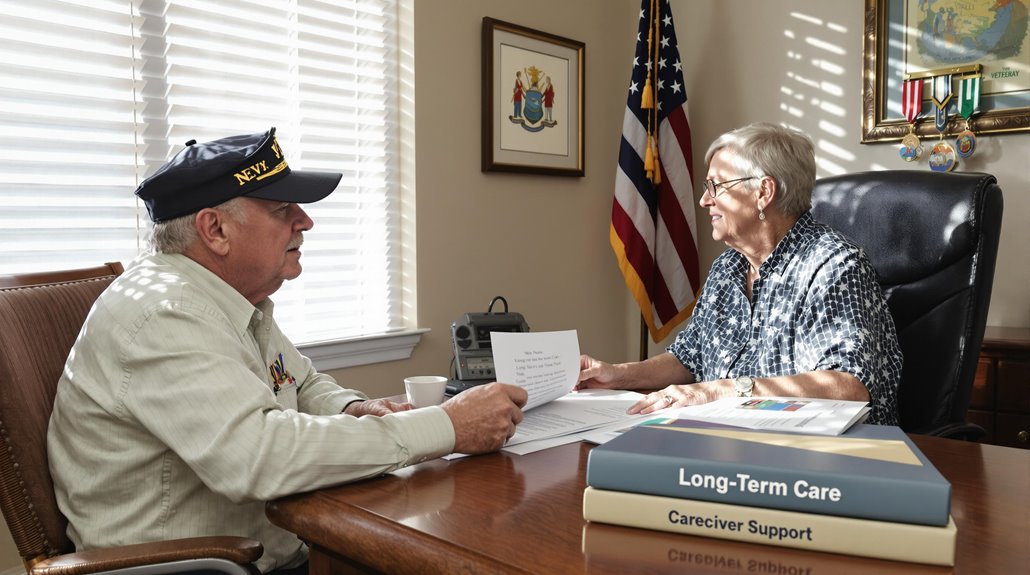New Jersey veterans face complex decisions when seeking long-term care benefits, with options spanning both federal VA programs and state-specific resources. The Garden State’s extensive system offers various levels of support, from home-based services to residential facilities, while protecting veterans’ assets through strategic planning. Understanding these benefits requires careful navigation through eligibility requirements, application procedures, and coordination between multiple agencies. The key to accessing ideal care lies in mastering these interconnected systems.
Key Takeaways
- VA long-term care in New Jersey offers comprehensive medical support, including 24/7 nursing care and rehabilitation services at facilities like Vineland Veterans Home.
- Veterans must provide DD214 forms, proof of NJ residency, and maintain honorable discharge status to qualify for combined VA-NJ benefits.
- Aid & Attendance Benefit provides additional financial support for non-medical care needs while awaiting full VA benefit approval.
- Strategic asset protection includes irrevocable trusts and exempt transfers, with Medicaid rules protecting primary residences up to $955,325.
- Veterans can access telehealth services, dental care through PACE, and specialized support programs for mental health and caregiver assistance.
Understanding VA Long-Term Care Services in New Jersey

While New Jersey veterans have earned their service benefits, maneuvering the extensive long-term care services available through the Department of Veterans Affairs requires understanding the full range of options.
VA service types encompass thorough medical support, ranging from 24/7 nursing care to specialized rehabilitation services.
The Vineland Veterans Home, a premier New Jersey facility, accommodates 300 residents while maintaining both state and VA certifications. This dual-accredited institution provides essential services including ADL support, physical therapy, and palliative care.
Veterans can access specialized medical treatments for conditions such as spinal cord injuries and respiratory ailments, with services delivered through Medicare-certified skilled nursing programs.
The facility’s Five-Star rating system guarantees quality care standards are consistently maintained for veterans, their spouses, and Gold Star parents.
Eligibility Requirements for Combined VA and NJ Benefits
How veterans navigate the dual benefit systems of VA and New Jersey state programs depends on meeting specific qualification criteria established by both entities.
Veteran eligibility for combined benefits requires proper documentation, including DD214 forms and proof of NJ residency. Service members must have received an honorable discharge and maintain state residency to access NJ-specific programs.
Veterans seeking dual benefits must provide DD214 documentation and verify NJ residency while maintaining honorable discharge status.
Key factors affecting qualification include service-connected disabilities, combat experience since September 11, 2001, and exposure to hazardous conditions like those at Camp Lejeune.
Veterans with VA disability ratings or pension status automatically qualify for enhanced benefits.
Priority consideration is given to Purple Heart and Medal of Honor recipients, former prisoners of war, and those who served in Gulf War operations between August 1990 and November 1998.
Navigating the Application Process for Long-Term Care

Successfully maneuvering the application process for VA long-term care benefits requires veterans to follow a structured, methodical approach.
Veterans should begin by assembling a thorough document checklist, including their DD Form 214, VA disability documentation, and financial records. The application tips emphasize gathering complete medical histories, insurance information, and household financial data before submission.
Veterans can submit applications through multiple channels, including online portals, mail, phone, or in-person visits to VA medical centers. Assistance from Veterans Service Organizations provides valuable guidance throughout the process.
After submission, applicants should actively monitor their application status and respond promptly to requests for additional documentation. Regular communication with VA representatives guarantees smooth processing, while maintaining organized records of all submitted materials facilitates effective follow-up if needed.
Financial Planning and Asset Protection Strategies
Effective financial planning and asset protection represent crucial components for veterans seeking to maximize their long-term care benefits. Veterans in New Jersey can enhance their financial literacy through strategic asset preservation techniques, including irrevocable trusts and exempt transfers to qualified family members.
The state’s Medicaid rules allow for protection of primary residences valued up to $955,325, while special needs trusts offer additional sheltering options. Veterans can coordinate VA and Medicaid benefits to minimize out-of-pocket expenses, often working with elder law attorneys to navigate complex eligibility requirements.
Life insurance conversions and trust-based solutions provide further opportunities to secure assets while maintaining access to essential care services. These strategies help veterans protect their hard-earned resources while ensuring thorough long-term care coverage.
Home-Based Care Options for NJ Veterans

New Jersey veterans seeking long-term care support have multiple home-based options that enable them to age comfortably in their own residences. The VA-approved programs include essential home health services through skilled aides who assist with daily activities like personal grooming and meal preparation.
VA-approved home care services allow New Jersey veterans to remain independent while receiving essential daily assistance from skilled professionals.
Veterans and their spouses may qualify for the Aid & Attendance Benefit, which provides financial compensation for non-medical care.
For families awaiting VA benefit approval, several programs offer immediate assistance without upfront costs. Organizations like Visiting Angels and Saba Home Health Care provide caregiver training and services during the 8-12 month processing period.
These programs guarantee continuous care through direct VA billing once benefits are approved, supporting wartime veterans who served 90+ days and require assistance with daily living activities.
Residential Care Facilities and Nursing Home Benefits
When seeking residential care support, veterans in New Jersey have access to an extensive network of facilities designed to meet their long-term healthcare needs. The options include VA-operated Community Living Centers, contracted community nursing homes, and state veterans’ homes like the Vineland facility, which accommodates 300 residents in a modernized campus.
Veterans must meet specific eligibility requirements for these residential care options, including service-connected disabilities, low-income status, or VA pension qualification.
The Vineland Veterans Home, located at 524 North West Boulevard, provides skilled nursing care to eligible veterans and their spouses who meet criteria such as honorable discharge and minimum service requirements.
Financial assistance varies by facility type, with VA copayments and income-based aid available to help offset costs.
Support Resources for Veteran Caregivers

Numerous support resources are available to veteran caregivers in New Jersey through both federal VA programs and state-specific initiatives.
The VA offers two primary caregiver support programs: the Program of General Caregiver Support Services (PGCSS) and the Program of Extensive Assistance for Family Caregivers (PCAFC). These programs provide essential services including skills training, peer mentoring, and financial assistance for eligible participants.
VA caregiver programs PGCSS and PCAFC offer comprehensive support through training, mentoring and financial aid for those who qualify.
Local community resources enhance federal support through Care2Caregivers’ telephone counseling and the Lifespan Respite Coalition’s provider networks.
VA Caregiver Support Coordinators Jennifer Adams-Barsch and Peterson Pierre-Paul guide caregivers through available benefits, while state-specific resources offer additional assistance through NJ aging agencies.
The VA’s Homemaker/Home Health Aide Program and Saba Home Health Care deliver tailored in-home support, ensuring veterans receive thorough care while supporting their caregivers’ well-being.
Key Changes and Updates for 2025 Benefits
The 2025 VA Benefits Guide introduces significant modifications to veteran long-term care services, building upon established caregiver support frameworks.
These VA service enhancements reflect a commitment to thorough care while adapting to evolving healthcare needs.
Key 2025 benefit changes include:
- Integration of telehealth consultations during long-term care episodes, ensuring continuous medical oversight
- Expansion of the PACE program to include dental and vision services through coordinated Medicaid/Medicare coverage
- Implementation of Money Follows the Person initiatives to support veterans moving from institutional settings
The updates prioritize nursing home admissions for veterans with critical medical needs while maintaining income cap rules through Qualified Income Trusts.
Enhanced mental health integration and caregiver education programs demonstrate the VA’s dedication to holistic veteran care.
Bottom Line
New Jersey’s commitment to veteran care remains evident through its extensive long-term care benefits and support systems. Veterans and their families can access essential services by understanding eligibility requirements, steering through application processes, and utilizing financial planning strategies. With continued program updates and expanding resources, New Jersey’s veterans have increasing opportunities to receive quality long-term care while preserving their assets and maintaining dignity in their senior years.




